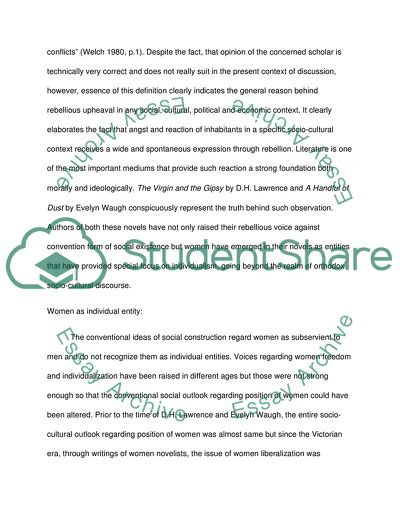Cite this document
(“Idea of Rebellion in The Virgin and the Gipsy by D. H. Lawrence Book Report/Review”, n.d.)
Idea of Rebellion in The Virgin and the Gipsy by D. H. Lawrence Book Report/Review. Retrieved from https://studentshare.org/literature/1732304-discuss-the-idea-of-rebellion-in-the-virgin-and-the-gipsy-by-d-h-lawrence-and-a-hand-full-of-dust-by-evelyn-waugh
Idea of Rebellion in The Virgin and the Gipsy by D. H. Lawrence Book Report/Review. Retrieved from https://studentshare.org/literature/1732304-discuss-the-idea-of-rebellion-in-the-virgin-and-the-gipsy-by-d-h-lawrence-and-a-hand-full-of-dust-by-evelyn-waugh
(Idea of Rebellion in The Virgin and the Gipsy by D. H. Lawrence Book Report/Review)
Idea of Rebellion in The Virgin and the Gipsy by D. H. Lawrence Book Report/Review. https://studentshare.org/literature/1732304-discuss-the-idea-of-rebellion-in-the-virgin-and-the-gipsy-by-d-h-lawrence-and-a-hand-full-of-dust-by-evelyn-waugh.
Idea of Rebellion in The Virgin and the Gipsy by D. H. Lawrence Book Report/Review. https://studentshare.org/literature/1732304-discuss-the-idea-of-rebellion-in-the-virgin-and-the-gipsy-by-d-h-lawrence-and-a-hand-full-of-dust-by-evelyn-waugh.
“Idea of Rebellion in The Virgin and the Gipsy by D. H. Lawrence Book Report/Review”, n.d. https://studentshare.org/literature/1732304-discuss-the-idea-of-rebellion-in-the-virgin-and-the-gipsy-by-d-h-lawrence-and-a-hand-full-of-dust-by-evelyn-waugh.


